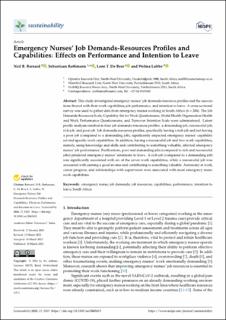Emergency Nurses’ Job Demands-Resources Profiles and Capabilities: Effects on Performance and Intention to Leave
Peer reviewed, Journal article
Published version
Permanent lenke
https://hdl.handle.net/11250/3068129Utgivelsesdato
2023Metadata
Vis full innførselSamlinger
- Institutt for psykologi [3086]
- Publikasjoner fra CRIStin - NTNU [38070]
Originalversjon
10.3390/su15065415Sammendrag
This study investigated emergency nurses’ job demands-resources profiles and the associations thereof with their work capabilities, job performance, and intention to leave. A cross-sectional survey was used to gather data from emergency nurses working in South Africa (n = 204). The Job Demands-Resources Scale, Capability Set for Work Questionnaire, World Health Organization Health and Work Performance Questionnaire, and Turnover Intention Scale were administered. Latent profile analysis resulted in four job demands-resources profiles: a demanding job, resourceful job, rich job, and poor job. Job demands-resources profiles, specifically having a rich job and not having a poor job (compared to a demanding job), significantly impacted emergency nurses’ capability set and specific work capabilities. In addition, having a resourceful job and two work capabilities, namely, using knowledge and skills and contributing to something valuable, affected emergency nurses’ job performance. Furthermore, poor and demanding jobs (compared to rich and resourceful jobs) predicted emergency nurses’ intentions to leave. A rich job (compared to a demanding job) was significantly associated with six of the seven work capabilities, while a resourceful job was associated with earning a good income and contributing to something valuable. Autonomy at work, career progress, and relationships with supervisors were associated with most emergency nurse work capabilities.

